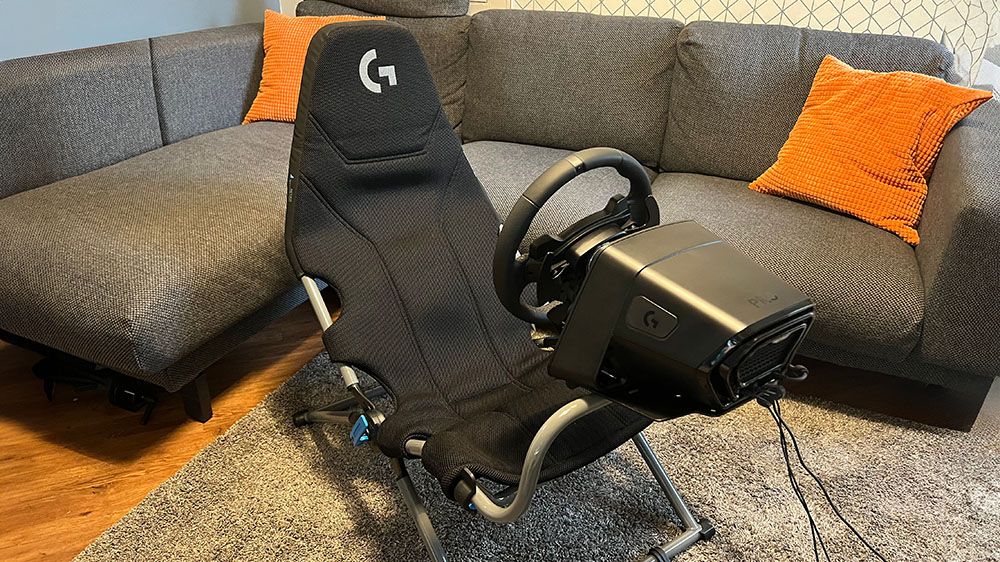12DOVE Verdict
The Playseat Challenge X has a few compromises you’ll need to live with on account of its storable form factor. Compared to awkwardly sitting at a coffee table or dominating your lounge with a giant cockpit setup, this is a high-quality sim racing seat.
Pros
- +
Impressive build quality
- +
Comfortable and stable seat
- +
Clever folding design
- +
Improved pedal mount
Cons
- -
Noticeable movement through the wheel
- -
Limited position adjustment options
- -
The pedal mount is prone to moving under load
Why you can trust 12DOVE
The Playseat Challenge X could seriously bolster your racing sim experience. Having one of the best racing wheels in your setup is a good start, but if you’re looking to get the most out of your games you’ll need a rig to mount it to as well. Playseat has been one of the go-to brands in racing setups for years and the Challenge has been a staple in that lineup.
The Challenge X is a refresh to one of the best gaming chairs on the market. It's another collaboration between Playseat and Logitech following in the footsteps of the excellent Playseat Trophy Logitech G Edition.
A more living room-friendly option rather than a full-size, rigid racing cockpit, the Challenge X offers a folding design and a lower £259/$299 price point that makes it better suited to more casual setups.
Assembly
There’s a bit of DIY to do before you can go racing but constructing the Playseat Challenge X Logitech G Edition was an impressively simple task. I tackled the build solo and never felt like a second pair of hands was necessary.
The printed instructions are clear and easy to follow and if you’d rather watch someone else put it together first then Playseat has a follow-along video on YouTube too. The combination of these simple instructions and the fact there are relatively few pieces overall meant the whole thing took less than half an hour to put together.
Design and Features
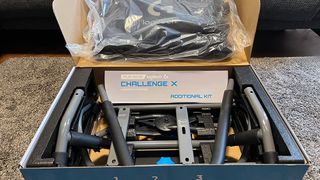
On first inspection, you’d be forgiven for thinking the Playseat Challenge X was simply a new coat of paint on the original Challenge. Taking a closer look, however, you’ll find this is a meaningful upgrade worthy of the new name with a handful of small but notable changes.
There is a new coat of paint, of course, being a Logitech G Edition the black of the original Challenge becomes a steely grey with a few flashes of electric blue that add extra character. It’s the same overall style as you’ll find on the G Edition Playseat Trophy and it’s refreshing to step away from solely dark black finishes on a bit of sim racing gear. The Challenge X’s steel frame is a little thicker in places than the original but the lighter colour scheme softens it off and it’s a less dominating presence in the room as a result.
The true beauty of the Playseat Challenge X is its collapsible design that makes it easier to move to one side and store when you’re not hitting the virtual tracks. This is a far more living room-friendly option than the giant, rigid Playseat Trophy and not unlike the racing equivalent of a folding deck chair. That practicality is seldom found in even the best console gaming chairs, save for The Foldable Gaming Chair, that is.
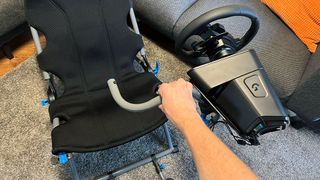
The X-shaped frame here is locked in place by a quick-release adapter that’s one of the new additions to the X variant. It’s a nice step up from the simple strap solution of the original model with six positions labelled on each side. There’s quite a range of movement as you cycle through each position so it’s worth trying one (though you’ll need to get up each time to adjust it), I’m six foot and found the flattest setting put me in the most comfortable position.
The pedal mount also received an upgrade on the Challenge X, mainly because it now actually exists. The angled steel supports come with pre-drilled holes that perfectly line up the bottom of the Logitech G Pro Pedal base and there are a few different positions to choose from. While it’s good to see some consideration here compared to previous efforts, the edge-only offering means pedal compatibility is limited out of the box. My MOZA SR-P Pedals for example would need extra BYO hardware to be able to be mounted. While it’s understandable that Playseat would focus on its brand partner Logitech’s pedals, simple cross bars or a tray similar to what’s included on the Playseat Trophy would have made the Challenge X far more widely compatible.
For the first time, Playseat has included gear shifter support as standard on the Challenge X in a move that begins to offset the price rise compared to previous generations. What was previously a £25 added extra, the additional steel beam that clamps to the wheel deck is now in the box and while I didn’t take advantage of it I will always applaud extras that don’t cost extra.
Performance
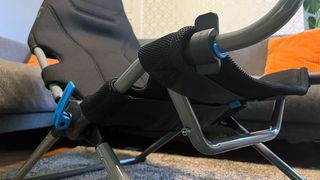
I’ve logged many a lap in the Playseat Trophy Logitech G Edition so the move to a more mid-range option in the range was an interesting one. The compromises needed to achieve a more portable form were clear from the start. These aren't necessarily criticisms though; the Trophy is so heavily braced that the experiences aren’t that comparable, in all honesty. Ultimately, as a flexible sim racing chair to pair with one of the best racing wheels for PC, the Playseat Challenge X is excellent.
Like the Playseat Trophy, the Playseat Challenge X, features a frameless seat rather than a solid bucket, with an ActiFit fabric sleeve supported by an outer frame. It’s a comfortable, effective solution that I was happy sitting in for long sessions. Throughout a full-length race in EA F1 23, I found the Challenge X’s hammock-like seat remained comfortable and the mesh fabric meant I didn’t overheat or feel the need to adjust my position. There’s a good amount of support offered by the suspended seat which almost hugs you in and moves with you to absorb quick direction changes.
I bolted the 11Nm direct drive Logitech G Pro racing wheel onto the Challenge X, which is probably a lot more than the chair would ideally like to be dealing with. Notably, all of Playseat’s marketing features the lightweight, entry-level Logitech G923 which is the kind of wheel I expect the Challenge X would rather ride with. That said, even under the extra weight and strain of the top-end G Pro, the Challenge X performed well.
The major drawback of the Challenge X is the noticeable amount of bounce and wobble that’s present at all times. Given the wheel deck is essentially balancing on a pole this wasn’t a surprise though. The rigidity and bracing points just don’t exist in a design like this so compromises need to be accepted. I didn’t find the movement impacted my gameplay and when I was zoned into a race I would often stop noticing it anyway. Again I imagine a lighter, less powerful wheel like the G923 may offer a more stable experience.
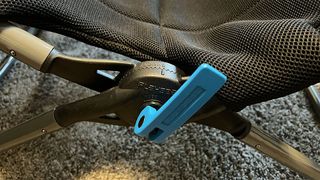
You’re limited to just one fixed mounting position for the wheel, with a limited amount of tilt adjustment forward and back. Given the choice, I would have moved the wheel a little further away but it was still in a comfortable enough range to not be a problem. Cleverly, the crossbar supporting the wheel is hinged on one side, allowing you to open up the cockpit and climb in and out with a little more dignity and ease. It’s a welcome feature though I found the G Pro Wheel is evidently heavier than the Challenge X is accustomed to and even with the extra tilt support bar extended the whole rig felt like it was in danger of toppling over when the bar was fully open.
The pedal area offers the greatest amount of customization on the Challenge X with an impressive range of distance adjustment available. The metal poles that slide in and out are only clamped in place by a pair of thumb screws though, and on multiple occasions, I found they gave out in a heavy braking zone and the pedals slid out from under my feet. It’s another compromise of the portable setup with little opportunity for more substantial bracing so you’ll just need to check and tighten them between races and pretend it’s a brake failure if it happens mid-race. A word of advice too, you’ll need to fully retract the pedals if you plan to fold up the Challenge X so grab a Sharpie and mark where your ideal length is to save setup time in future sessions.
With racing done with, the Challenge X does collapse down into a compact bundle but in my case not quite as compactly as some of the marketing photos suggest. The larger G Pro wheelbase collides with the seat before the frame is fully folded and leaves a slightly larger footprint as a result. The same is true with the long G Pro pedal base. This fouls the crossbar under the seat so sticks out further than is ideal. The whole package is still much smaller than a fixed rig like the Playseat Trophy however and much easier to move around and store.
Should you buy the Playseat Challenge X?
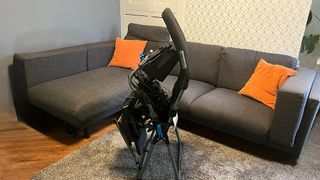
Once again Playseat has collaborated with Logitech on a refresh that brings fundamental improvements to one of its existing racing seats. The Challenge X is an excellent option for living room racers with upgrades over the previous model that make a noticeable difference day to day.
There are a couple of concessions you’ll need to live with but compared to awkwardly sitting at a coffee table or dominating your lounge with a giant fixed rig, this is a high-quality sim racing seat that performs well. If you need something that'll store away easily, this is a great option.
How we tested the Playseat Challenge X
I used the Playseat Challenge X Logitech G Edition for a number of races in EA F1 23 and Forza Motorsport paired with a Logitech G Pro Racing Wheel and Pedals. I also checked for compatibility with the MOZA R12 wheelbase and MOZA SR-P Pedals.
For more on our testing ideology here at 12DOVE, take a look at our hardware policy.
Want to go console-specific on your racing setup? Check out the best PS5 steering wheel, the best Xbox steering wheel, and if you're expanding into the skies, the best joysticks.
Alex is a streamer who has been creating gaming content for over a decade, streaming on Twitch regularly across the last five years. With a degree in film and a background in sports media, you'll find him jumping between 60,000 seat stadiums and his Animal Crossing island (where he's growing pears, in case you were wondering).

"30 years of history reside in our tape backups": PlayStation's building a game preservation mineshaft vault with 200 million files going back to a 1994 build of PS1 JRPG Arc the Lad

The other big Soulslike out this week has some Bloodborne and Dark Souls 3 in its combat, dev says, but "we would rather call AI Limit an action RPG"

The Last of Us showrunner says "so much" has happened in the five-year gap since we last saw Joel and Ellie: "That's part of the mystery of the season"
